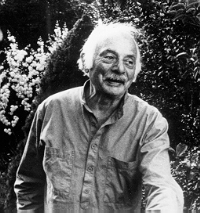Narration question
One of the very interesting things about David Foster Wallace's Infinite Jest is how little happens in the immediate scene. The vast majority of the novel's 1000 pages are given over to explaining what has been happening, or explaining the (exhaustively complex) pre-conditions that explain why what happens what happens. If you take Randy Lenz, for example, the squirreliest of Ennet House's residents and generally not one who's going to succeed with its anti-drug programs at all, let's take a look at what happens to him in the novel's immediate scene. Not much. I hope that it is not doing the novel or the character a great disservice to say that Lenz enters Ennet House, a halfway house in Enfield (Boston) MA, struggles with the protocols of starts taking walks, develops a habit of killing small mammals, which leads him one night to a house full of Canucks (Canadians are somewhat maligned throughout IJ; tensions with our neighbor to the north are high, for involved reasons), where he does something that's not nice at all and admittedly does set in motion of IJ's most high-pitched action sequences. But that's sort of, well, it. With Lenz, as with most of the characters, we read more about what they've done than we do about what they do.
I'm generalizing a tiny bit in hopes of making a point. Plotwise, IJ is so far and away one of the 20th century's most complex literary structures. The number of POVs and social spheres that we as readers are intimate with and privy to staggers. And let's go ahead and submit that, barnone, every sentence brims with linguistic attention and innovation. And, with each one of our Points of View (Marathe, Orin, Lenz, Mario Incandenza, and of course and most importantly Hal Incandenza and Don Gately), we receive in each section a compendium of facts about what's happening today in their day-at-a-time existences. But when you get down to brass tacks and look at the way the novel's attention's spread between the actually-happening now and the happened-back-then-but-trust-me-it's-informing-what-little-is-happening-in-the-actual-now, you can see that it's the latter style / approach that defines much of the novel's shape and content.
Again, don't get me wrong: there's a great deal happening in the novel's present. The novel's descriptions and accounts of what's happened previously, however, outweighs what's happening in the "now." This perception might be in error; if I had a scale and the time and the inclination to sacrifice my copy, I'd do a weigh-in. But it feels accurate. And it's therefore a mammoth testament to IJ's achievements that all of this exhaustive accounting never causes a reader to smack brow and say "What about what's happening with the X situation / Mrs. Y?"
This quality heartens the hell out of me. Good Ground as it stands is squarely on the IJ side of things in that a majority of the pages to date involve what's happened to its characters; what happens in the now is somewhat fleeting. At times I've worried about how "immediate" the actions taken would seem. But, and while this post isn't meant as an apologia, I'm beginning to think that such an approach of "past-heavy" narration in fiction need not necessarily lose anything in terms of immediacy, vividness, and being able to see the characters as they are, acting in the now.
Maybe this approach offputs the Joe / Josephina Q. Public. What do you think? Do you like your novels up front and pepping / zooming along? Do you mind being filled in? What if you're filled in in a peppy / zooming way?
I'm generalizing a tiny bit in hopes of making a point. Plotwise, IJ is so far and away one of the 20th century's most complex literary structures. The number of POVs and social spheres that we as readers are intimate with and privy to staggers. And let's go ahead and submit that, barnone, every sentence brims with linguistic attention and innovation. And, with each one of our Points of View (Marathe, Orin, Lenz, Mario Incandenza, and of course and most importantly Hal Incandenza and Don Gately), we receive in each section a compendium of facts about what's happening today in their day-at-a-time existences. But when you get down to brass tacks and look at the way the novel's attention's spread between the actually-happening now and the happened-back-then-but-trust-me-it's-informing-what-little-is-happening-in-the-actual-now, you can see that it's the latter style / approach that defines much of the novel's shape and content.
Again, don't get me wrong: there's a great deal happening in the novel's present. The novel's descriptions and accounts of what's happened previously, however, outweighs what's happening in the "now." This perception might be in error; if I had a scale and the time and the inclination to sacrifice my copy, I'd do a weigh-in. But it feels accurate. And it's therefore a mammoth testament to IJ's achievements that all of this exhaustive accounting never causes a reader to smack brow and say "What about what's happening with the X situation / Mrs. Y?"
This quality heartens the hell out of me. Good Ground as it stands is squarely on the IJ side of things in that a majority of the pages to date involve what's happened to its characters; what happens in the now is somewhat fleeting. At times I've worried about how "immediate" the actions taken would seem. But, and while this post isn't meant as an apologia, I'm beginning to think that such an approach of "past-heavy" narration in fiction need not necessarily lose anything in terms of immediacy, vividness, and being able to see the characters as they are, acting in the now.
Maybe this approach offputs the Joe / Josephina Q. Public. What do you think? Do you like your novels up front and pepping / zooming along? Do you mind being filled in? What if you're filled in in a peppy / zooming way?


